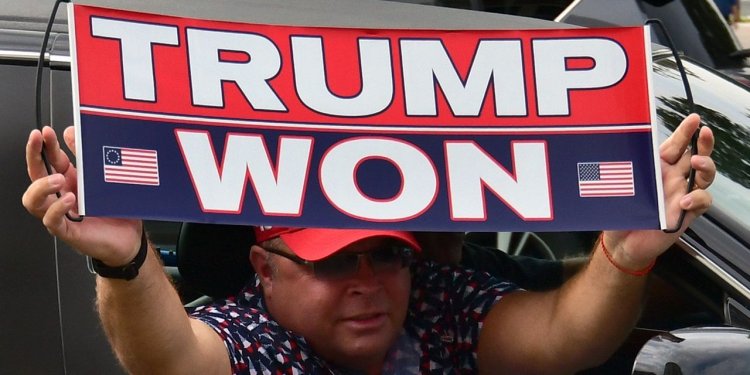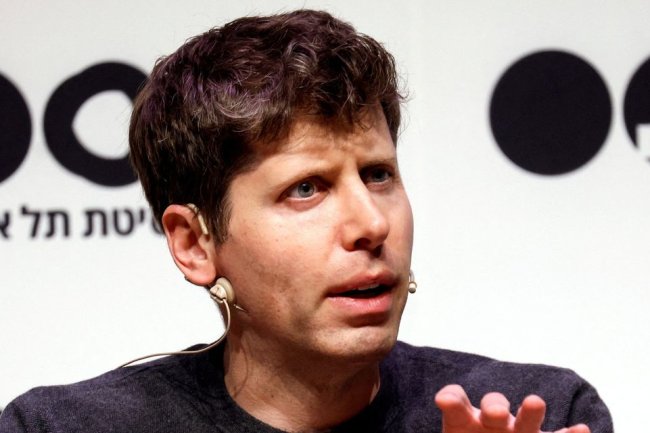What Was Donald Trump Thinking?
Good luck finding out. But psychology can help us grasp why he, like so many Democrats, clung to lies. By Allysia Finley Aug. 6, 2023 11:53 am ET A man holds a ‘Trump Won’ sign outside the former president’s arraignment in Washington, Aug. 3. Photo: Carol Guzy/Zuma Press Did Donald Trump believe the 2020 election was stolen? Who knows? Discerning his thoughts would be as challenging as breaking into an iPhone without the passcode. Yet Mr. Trump’s attorney claims the government can’t prove, at least not beyond a reasonable doubt, that the former president knew his election-fraud claims were false, even if he had been advised by the vice president, Justice Department, director of national intelligence and White House attorneys that they were. Ther


A man holds a ‘Trump Won’ sign outside the former president’s arraignment in Washington, Aug. 3.
Photo: Carol Guzy/Zuma Press
Did Donald Trump believe the 2020 election was stolen? Who knows? Discerning his thoughts would be as challenging as breaking into an iPhone without the passcode.
Yet Mr. Trump’s attorney claims the government can’t prove, at least not beyond a reasonable doubt, that the former president knew his election-fraud claims were false, even if he had been advised by the vice president, Justice Department, director of national intelligence and White House attorneys that they were. There might be some truth to that.
Merely being informed that something is false often doesn’t change people’s convictions. A 2019 Ipsos/Reuters poll found that 50% of Americans who were aware of Robert Mueller’s report, which found no evidence that Mr. Trump’s campaign colluded with Russia in the 2016 election, still believed that it had.
After the report’s release, 84% of Democrats still believed the collusion hoax, which had been peddled by the media and partisans like California Rep. Adam Schiff. Seventy-nine percent said they hadn’t learned anything from the report that changed their minds about the issue. Two-thirds of Democrats wanted Congress to continue investigating.
How are Mr. Trump’s convictions about election fraud in the face of countervailing evidence any different from Democrats’ continued subscription to the Russia collusion lie? They’re not, but psychologists wouldn’t find either surprising.
A wealth of social-science research finds that people are predisposed to accept information compatible with their existing beliefs and knowledge. They are also more likely to believe things that others in their orbit do. Curiously, countervailing evidence often has the effect of entrenching a false belief.
“Compatibility with other knowledge increases the likelihood that misleading information will be accepted, and decreases the likelihood that it will be successfully corrected,” explains a 2012 article in the journal Psychological Science in the Public Interest.
The idea that Democrats were trying to steal the election by stuffing ballots and employing other deceitful means was consistent with Mr. Trump’s belief that his opponents were out to get him. Democrats had also lied in the past. Mr. Schiff propagated the Russia-collusion story despite firsthand knowledge that it was false.
Mr. Trump was also surrounded by supporters who believed the election was being stolen. This conviction fit comfortably with how Democrats had gone to court in the weeks before the election to change mail-in ballot rules to their hoped benefit. These various strands formed a psychologically coherent and compelling story—even if all of the pieces weren’t true.
“Coherent stories are easier to process than incoherent stories,” the journal article explains. “An engaging story from an untrustworthy source may be remembered and accepted long after the source has been forgotten.” While Mr. Trump’s advisers who claimed that the election was being stolen weren’t credible, their stories were engaging.
Many in Mr. Trump’s inner circle rejected false stolen-election theories, so why didn’t he pull himself back from the brink? “Retractions rarely, if ever, have the intended effect of eliminating reliance on misinformation, even when people believe, understand, and later remember the retraction,” the journal review explains. One reason is people “generally do not like to be told what to think and how to act, so they may reject particularly authoritative retractions.”
The instinct for self-preservation may also override all facts. Mr. Trump couldn’t acknowledge he had lost the election because doing so would threaten the perception he had built of himself as a winner. His ego wouldn’t let him concede defeat.
This need for self-preservation may also explain why President Biden continues to deny that his son Hunter did anything wrong despite evidence of his misadventures, including foreign influence-peddling. Acknowledging that Hunter is a scoundrel might also require Mr. Biden to accept—at least to himself—falling short as a father.
Read More Life Science
- Climate Change Obsession Is a Real Mental Disorder July 30, 2023
- Wokeness Hobbles Disney as It Faces the Streaming Challenge July 23, 2023
- Bidenomics and the Boom in DEI and ESG Jobs July 16, 2023
It’s also true that people resist being told that their actions and beliefs are wrong. Messrs. Trump and Biden are no exceptions. This resistance is especially common among addicts. In these pages last summer, I recited the abundant research tying marijuana use to mental illness. The piece predictably sent pot-heads into high dudgeon.
Such resistance occurs whenever deeply held beliefs are challenged. Try explaining to progressives that climate change isn’t going to light the world on fire and that their policies will do more harm than good. All the evidence in the world won’t convince them they’re wrong.
Human psychology doesn’t excuse Mr. Trump’s actions and probably won’t exculpate him in court. But it does provide an alternative explanation to special counsel Jack Smith’s allegation that he was trying to steal the election.
Journal Editorial Report: The Department of Justice accelerates its legal offensive. Images: Zuma Press/AFP/Getty Images Composite: Mark Kelly The Wall Street Journal Interactive Edition
What's Your Reaction?













